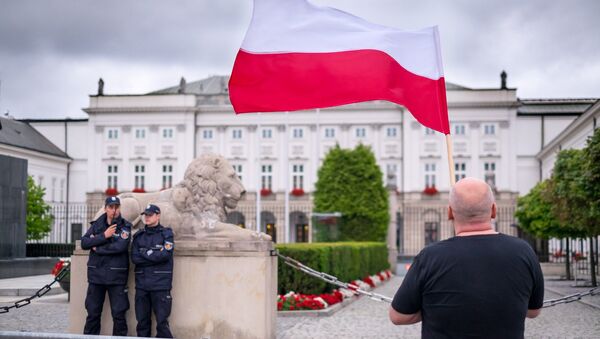"I don't know whether we have a common future, but we are working on it. The Italian-Polish (model) will probably replace the French-German one," the Deputy Prime Minister added.
As for Polish political scientist Adam Wielomski, he is skeptical about the possible Polish-Italian Union. He believes Salvini can be considered a Eurosceptic, while Polish Euroscepticism is intended exclusively for the internal electorate.
READ MORE: Poland And Italy Agree to Boost EU's External Border
Adam Wielomski: I have no doubt that it's not a random visit, since there are elections to the European Parliament in May. Salvini, along with Marine Le Pen, is making up a large international euro-skeptic coalition. It's reasonable to assume that they consider Law and Justice a euroskeptic party and therefore are attempting to incorporate it into their coalition. It seems to them that this would be easy, since the party's current coalition partners in the European Parliament, including the conservatives, are lose their weight, and after the May elections, it will simply cease to exist
During the negotiations in Warsaw, they discussed a common program for the transformation of Europe, which will be presented to other European political movements. Judging by the comments of Polish experts, the Italian Deputy Prime Minister has failed to convince Jarosław Kaczyński to team up.
In fact, judging by their actions, we can assume that they're moving in quite the opposite direction. For instance, you can't be a euro-skeptic and at the same time promote the idea of forming a common European gas and energy security policy, which implies strengthening the EU structures. Therefore, I think that Western European politicians are misjudging Jarosław Kaczyński's party. Their euro-skeptic declarations are mainly intended for the Polish electorate, and not at all manifested in their political actions on the international stage. I suppose that, as far as a union or any programmatic coincidences are concerned, there is no chance for that.
READ MORE: Political Analyst: Fort Trump Idea in Poland Will Fade Away
In addition, there are discrepancies associated with who exactly the European countries consider to be the EU's enemies. France and Italy are emphasizing the German threat, while Law and Justice consider Russia the main enemy of the European Union. As for the United States, they believe it to be the main partner and, in some way, the patron of the EU, particularly the recently-admitted states. Essentially, I don't see any possibility of joint action.
Only the American lobby can promote the Law and Justice's entry into a coalition to which it shouldn't really belong, since it is not a euro-skeptic party and doesn't proclaim any need to change the EU model.
Kaczyński and Salvini have serious complaints about Brussels's policies; however, they're really interested in its financial capabilities, aren't they?
Law and Justice are aware of Poland's dependence on EU money. Italians don't really feel this, as Italy is a country that contributes more than it gets from the EU budget. Thus, it makes it hard for Law and Justice to take any euro-skeptic action.
Sputnik: In your view, how will the situation develop after Salvini's visit?
Adam Wielomski: I think that everything will end with a formal statement about the desire for further cooperation, which actually means nothing. The issue will be completely solved only after the elections to the European Parliament. Law and Justice's capacity to join coalitions in the European Parliament will largely depend on that.
I believe that the European People's Party is the most suitable cgenybr:partner for Law and Justice in the European Parliament; but the latter doesn't really want this, since the European People's Party includes members of the Civic Platform and the Polish Peasant Party. And if it turns out that the Law and Justice representatives end up without factions due to the lack of various privileges and the impossibility of functioning in the European Parliament, they may come up with various solutions. However, the creation of a single parliamentary Eurogroup seems unlikely to me.
The views and opinions expressed by the speaker do not necessarily reflect those of Sputnik.





